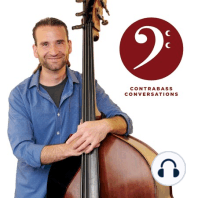37 min listen

215: Robin Kesselman on audition strategies, injury recovery, and bow arm practicing
215: Robin Kesselman on audition strategies, injury recovery, and bow arm practicing
ratings:
Length:
53 minutes
Released:
May 23, 2016
Format:
Podcast episode
Description
Today's episode features Houston Symphony principal bassist Robin Kesselman. Robin studied with David Allen Moore and Paul Ellison at the Coburn School of Music and the University of Southern California, and with Hal Robinson and Edgar Meyer at the Curtis Institute of Music. He has also performed as Guest Principal Bass with the Saint Paul Chamber Orchestra, travelled internationally with both the Philadelphia Orchestra and the Los Angeles Philharmonic, and performed with the National, Atlanta, and Baltimore Symphonies. During Robin’s time at USC, he sustained a playing injury that took him out of commission for a prolonged period. We dig into how Robin ultimately recovered from this and how it changed his approach to practicing and performing on the bass, and how he practiced while he was out of commission. This was a left arm injury, and Robin continued to practice open string and harmonics with the bow, going into his lessons and working on the Bottesini Concerto on open strings. We also discuss how Robin approaches the audition process: his preparation strategies, his musical goals for an audition, and using visualization techniques. We also feature excerpts from Krzysztof Penderecki's Duo Concertante with Eunice Kim on violin. Enjoy! Interview Highlights Discoveries During Playing Injury: sitting in practice room - “this hurts, but it also still sounds bad” - the mistake of pushing through pain this time spent not using his left hand ultimately took his bow game to a new level - he spent large amounts of time just practicing with the right hand - playing solos and excerpts on open strings / harmonics in lessons! “the building blocks with which I was making my shapes were not completely honest” - referring to the bow arm mental practice / visualization - he got into this during this time period learning the difference between an ache and something more serious Thoughts on Auditioning: there’s nothing that isn’t practicable timing and pulse mathematical pulse/note division vs. feeling right the fallacy of perfect audition rounds similarities between prepping for an audition and a recital auditions have to be an artistic endeavor and about musical expression if you walk out and your whole goal is to play notes that are even and in tune, the second that one note isn’t exactly the same as another note you officially have nothing left to offer, because your single goal has crumbled if your goal is to make lines and to make shapes and be expressive, it’s ok if one note is a little shorter than the others philosophy from David: as soon as you come in and things are in tune and in time, you are officially at zero The Audition Process in Detail: record constantly during this whole process -throughout the whole day first 50% of the interval really hibernate and work things super slow - considerably under 50% tempo move something up 40 clicks over a period of weeks A and B lists that kind of parallel each other (one Mozart Symphony on one and one on the other, for example) doesn’t play for anyone during this time - nothing’s put together - it’s all really cut up at this point next 25% buff out the edges, smooth out the music, give it a shine playing with recordings, getting the flow right last 25% take the show on the road, play for anybody and everybody, start setting up mock auditions and lessons with other (non-bass) instrumentalists the last week go back to “hibernating" stop playing for people - running rounds - 4-5 excerpts in a row hours wise it’s similar through he whole process, but the hours are being used differently all the way until audition time, there was never a day/time when he could not continue to make things better have a specific game plan for those 20 minutes of warm-up once you arrive at the hall bass players don’t hire bassists - committees of other instrumentalists do
Released:
May 23, 2016
Format:
Podcast episode
Titles in the series (100)
6: John Grillo Interview by Contrabass Conversations